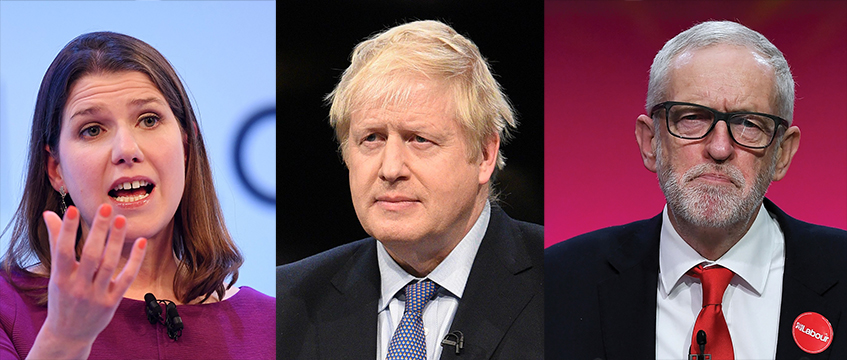Property plagued by ‘fiscal incontinence’
News
by
Anna Ward and Emma Rosser
The property sector has long harboured fears of a Labour government, but the Tories could now prove worrying for the industry as well.
This week, the three main opposition parties published manifestos promising huge investments in housebuilding and infrastructure, while the Conservatives drip-fed theirs as the only major party yet to publish a manifesto ahead of the General Election on 12 December.
Jeremy Corbyn pledged to deliver the largest council housebuilding programme since the end of World War II, backed by a £75bn fund, alongside plans to create a national investment bank to provide £250bn of lending over 10 years.
The property sector has long harboured fears of a Labour government, but the Tories could now prove worrying for the industry as well.
This week, the three main opposition parties published manifestos promising huge investments in housebuilding and infrastructure, while the Conservatives drip-fed theirs as the only major party yet to publish a manifesto ahead of the General Election on 12 December.
Jeremy Corbyn pledged to deliver the largest council housebuilding programme since the end of World War II, backed by a £75bn fund, alongside plans to create a national investment bank to provide £250bn of lending over 10 years.
Labour has promised to ramp up the delivery of council houses to 150,000 new homes a year by 2024.
The Green Party and the Liberal Democrats have both pledged to deliver 100,000 social rent homes. This compares to levels of just 6,287 social rent homes last year, according to the Ministry of Housing, Communities and Local Government.
Residential analyst Neal Hudson said: “If a new government is prepared to put up the money for these homes, this is possible.
“There are other factors – having access to the land to build them, the construction industry resources and the council resources to manage them.”
In contrast, the Tories are favouring first-time buyers and private development, but scaling back ambitions with a goal to deliver 1m homes by 2025, down to 200,000 per year from their current goal of 300,000.
The party has promised to bring in a long-term fixed-rate mortgage that will only require a 5% deposit. The Conservatives also plan to provide a 30% discount for first-time buyers in their own neighbourhoods.
On infrastructure, the party has promised £100bn over five years. In contrast, the Lib Dems have earmarked £50bn for infrastructure spend across the UK, as well as £15bn to make 26m homes more energy efficient.
The Greens have allocated £100bn a year to be spent on measures including retrofitting homes and new rail networks.
Industry scepticism
But many are sceptical about the financial clout behind these headline-grabbing pledges.
Former cabinet secretary Gus O’Donnell told the Westminster Property Association at its annual lunch this week that the “fiscal incontinence of both parties is pretty breathtaking”.
And Savvas Savouri, chief economist at Toscafund Asset Management, said: “What we need for the first time is for someone to address fiscal inefficiencies in property markets; not just the physical supply, but the taxation elements that have been so harmful. Stamp duty is wrong.”
He added that increasing affordable housing production to such levels would be “incredibly disruptive”.
Melanie Leech, chief executive of the British Property Federation, argued there was “plenty of room” for more ambitious housing projects “to counter the housing crisis”.
Leech also called for increased funds to support the infrastructure required for development and growth, highlighting digital and transport spend.
“If the UK economy is to increase its productivity and unlock its full potential, the next government must implement an ambitious programme of infrastructure investment.”
Despite downgrading its ambitions on the housing front, the Conservative Party’s pro-business outlook is likely to be more appealing to the sector than Labour’s punitive tax measures for foreign investors.
“There is a huge weight of money to be spent in the UK but more development will kick off under the Conservatives,” said one senior property agent. “Corbyn wants to renationalise pretty much anything, which will make everyone scared and foreign investors could become more negative on the UK.”
Removing the handbrake
Savouri argued that a Conservative majority would “remove a handbrake on the economy”. He added: “There are only two realistic options: a Tory majority, or a combination of Labour with the Lib Dems and the SNP. In macro terms, these could not be more diametrically opposed. Given commercial property and residential are so sensitive to the economy, we could potentially see a strong uptick in occupier and investor demand with a Conservative majority. The alternative is the reverse: paralysis. We don’t know how long a fragile coalition would last.”
Risk to foreign investment
The broader themes of Labour’s manifesto could also alienate foreign investors from buying UK property, said Walter Boettcher, director of research and forecasting at Colliers International.
In his manifesto, Corbyn promised to bring in a wealth-based taxation to “end the unfairness that sees income from wealth taxed at lower rates than income from work”.
Boettcher said: “Foreign investors used to invest happily in residential and commercial property but [former chancellor of the exchequer] George Osborne started tightening up the tax regime for property and a shift to a wealth-based taxation could put them off further.”











